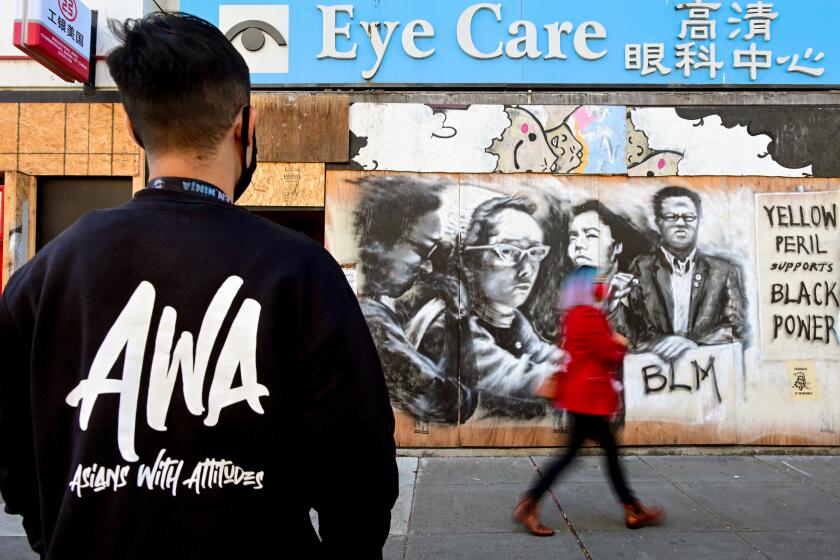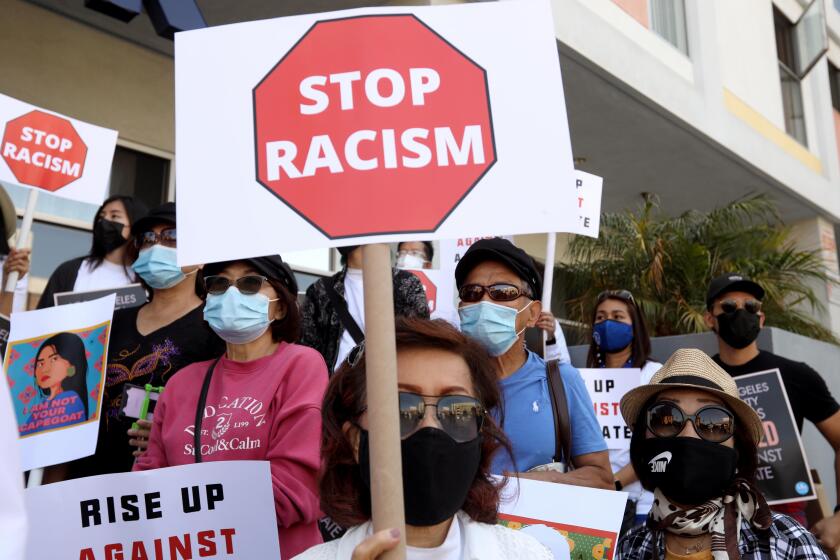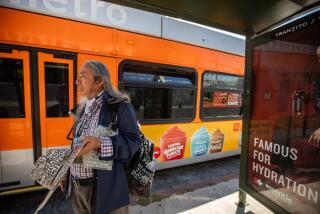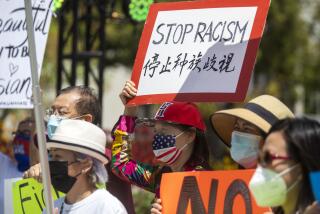Self-defense classes help Asian senior citizens fight racist attacks
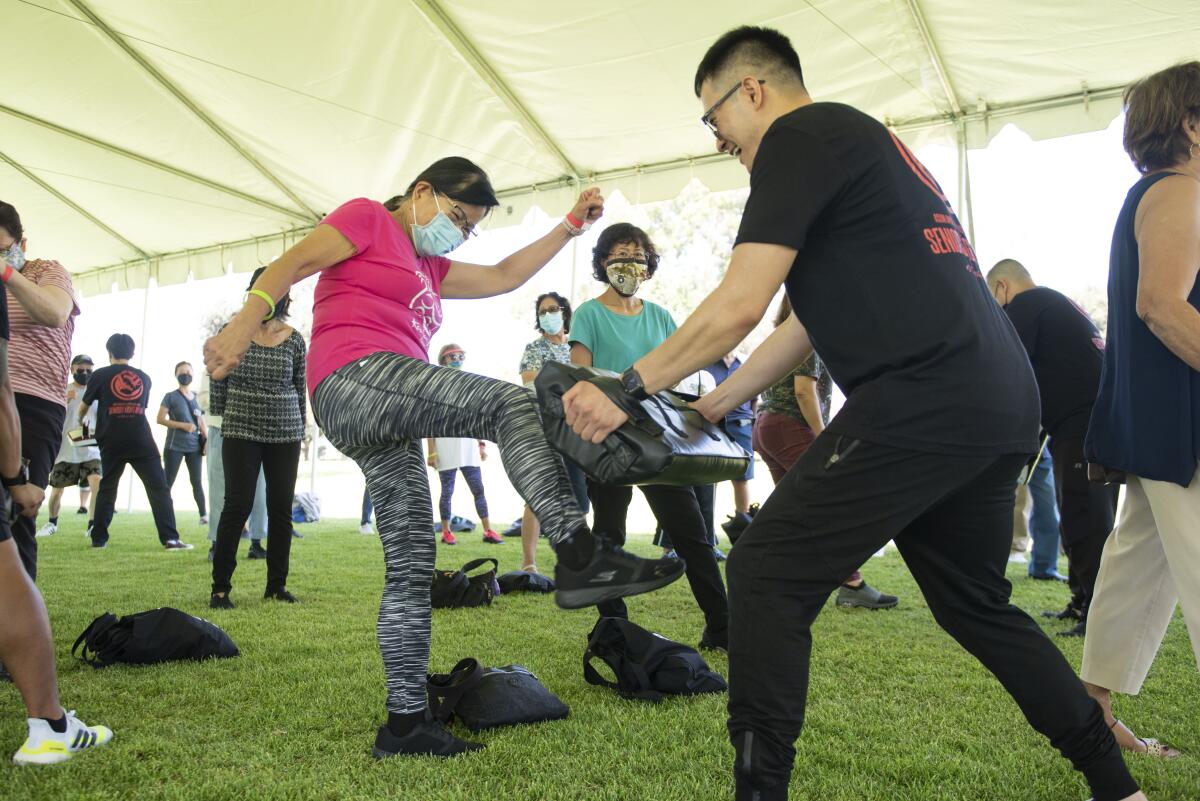
- Share via
In June, a 70-year-old Filipino American man was punched in the face at Don Knabe Community Regional Park in Cerritos.
The assailant told the man to “go back to your country.”
A month later, dozens of Asian American senior citizens practiced self-defense moves in the same park where the attack occurred.
Wearing sun visors and fanny packs, the seniors kicked, punched and jabbed.
Sovanna Yeang, 65, was practicing groin kicks, slamming her leg into a foam pad that a volunteer held in front of his crotch.
Yeang, who is Chinese Cambodian, said she is concerned for her safety after seeing television news reports about attacks against elderly Asians.
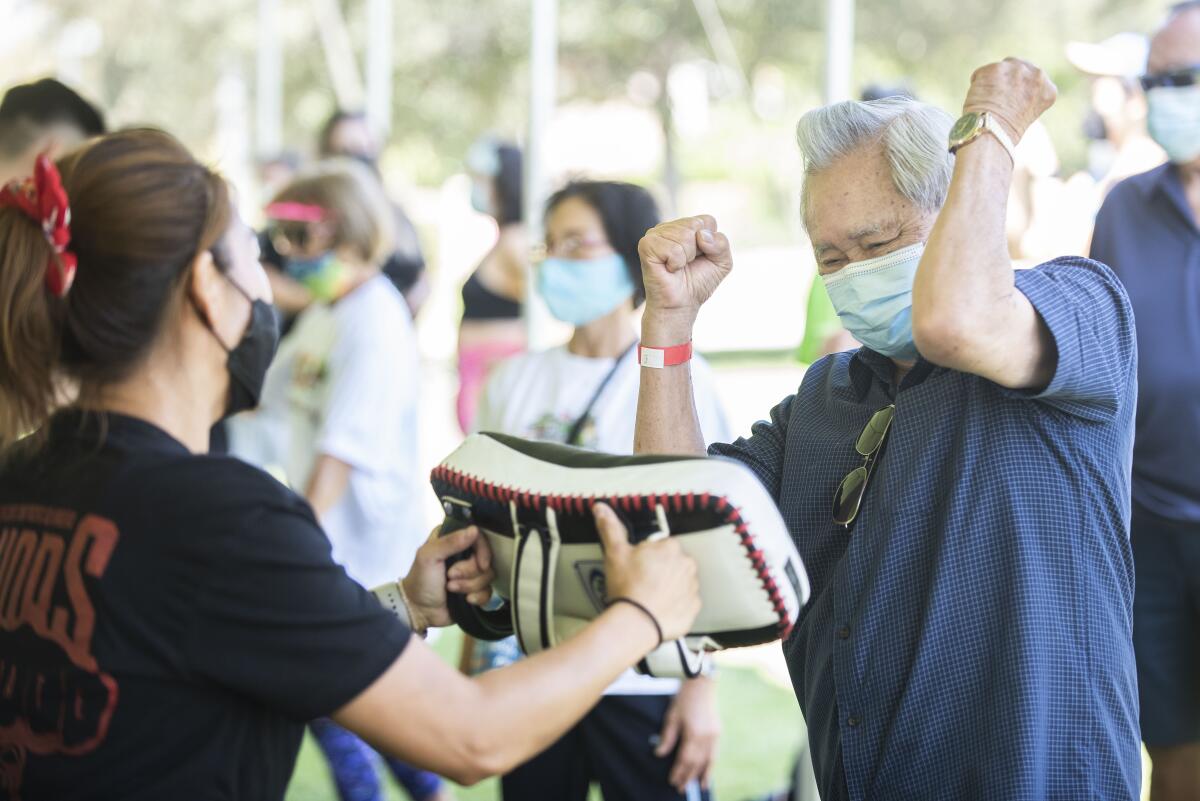
“If somebody attacked me, I didn’t know what to do,” she said. “I’d just run. I didn’t know how to yell or anything. Now, I learned some things. I’m not scared anymore.”
The self-defense class was organized by Seniors Fight Back, which formed early this year as hate crimes against Asians rose during the pandemic.
Violent attacks, captured on video, against older Asians in Oakland and San Francisco Chinatowns have left some senior citizens so fearful that they barely leave the house.
So far, Seniors Fight Back has hosted five classes providing seniors with basic grounding in how to defend themselves against an attacker.
“There were so many attacks on our elders, and I was just getting really frustrated,” said Tony Dang, 32, a cofounder who owns a Vietnamese pancake catering company in Fountain Valley.
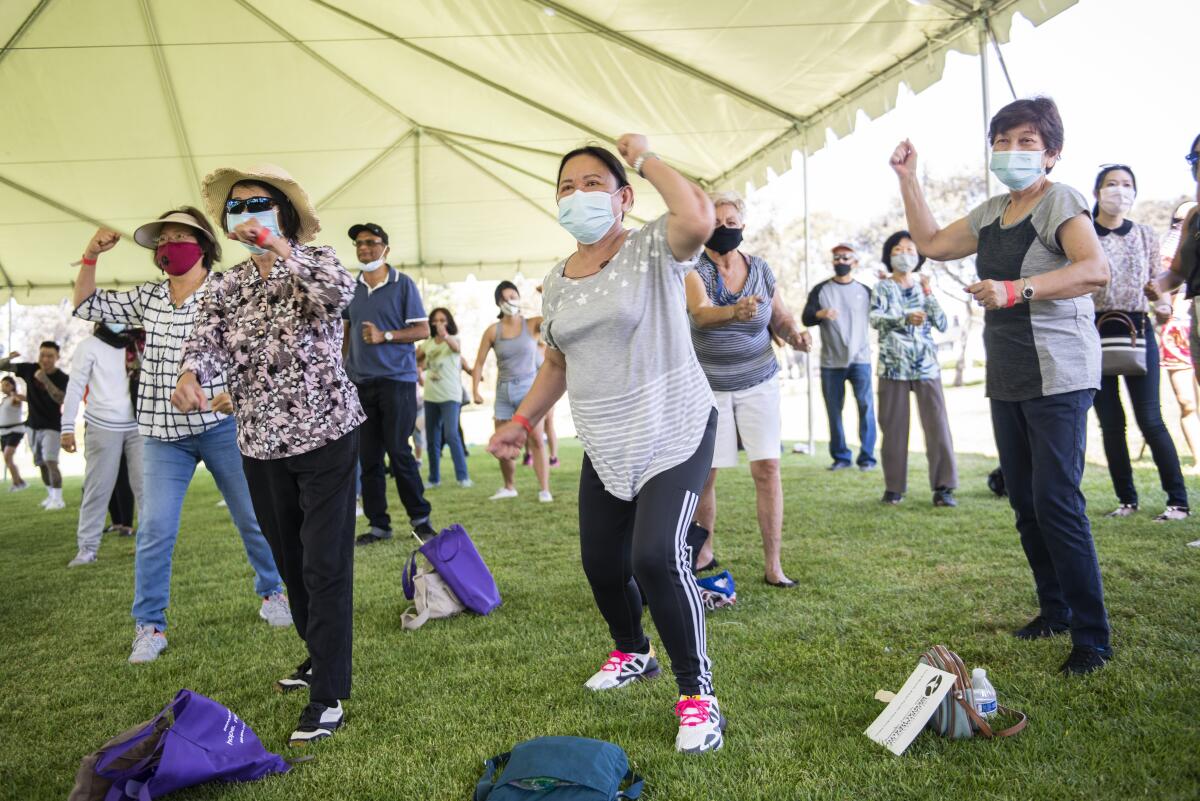
While some Asian Americans have organized volunteer patrols to escort seniors to their destinations, the answer for Dang lay in self-defense.
Even before the Atlanta-area spa attacks that killed eight people, including six women of Asian descent, volunteer groups have sprung up to defend their Asian American communities in California.
A friend, Andy Luong, had shared an Instagram post about boxing classes that raise funds for Asian American and Pacific Islander organizations.
Dang asked Luong to connect him with Box for Change, the group that runs the classes. Dang spoke with Hong Lee, the 35-year-old victim of a racist verbal attack at a Los Angeles restaurant, who had been taking the boxing classes.
The three began discussions that expanded to include a network of friends and acquaintances, including mixed martial arts fighter Ron Scolesdang.
Their first class, in Hawthorne on May 12, drew about 20 seniors. A few weeks later, in Little Saigon, more than 200 showed up.
The group of about 10 volunteers is seeking nonprofit status and is hoping to expand to more cities in Southern California and across the country.
In California, anti-Asian hate crimes more than doubled last year, according to the state attorney general.
New report shows the breadth of anti-Asian racism, with attacks reported in hospitals, restaurants and schools
Then-President Trump has emphasized the coronavirus’ Chinese origins, and some people have attacked Asian Americans with rhetoric asserting that they are to blame for the pandemic.
Elderly Asian immigrants who are assaulted are often reluctant to speak out, said Linda Vo, a professor of Asian American studies at UC Irvine.
Many are wary of the police, uncomfortable about communicating in English or ashamed about being victims, she said.
But the rise in anti-Asian attacks has mobilized many Asian Americans and encouraged them to share their experiences, according to Judy Wu, a professor of Asian American Studies at UC Irvine.
“It’s been such an intensity of racialized attacks that more and more people are understanding that there’s a need to speak up,” Wu said.
Self-defense classes for senior citizens have also caught on in Little Tokyo.
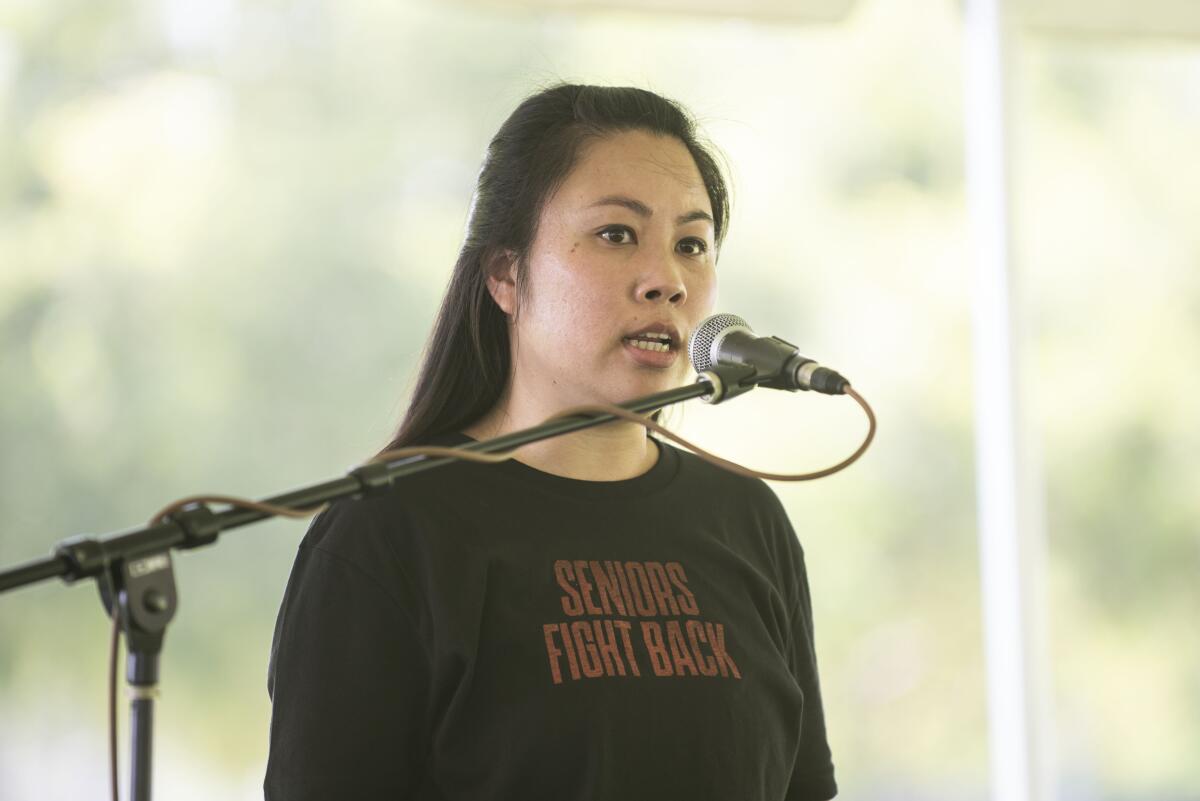
Janette Lee, a second-degree black belt in tae kwon do who served as senior activities coordinator for the Little Tokyo Service Center, organized five self-defense classes this year.
Most of the participants were low-income, monolingual Korean, Japanese or Chinese American senior citizens, Lee said. Almost all were female, and some told stories of being attacked.
“I started because I was really angry about what was happening, because when I was looking at the news, I saw that most of the hate crimes were targeted toward seniors,” Lee said.
Art Ishii, who has taught martial arts in Little Tokyo for three decades, hosted two self-defense workshops in June.
About 30 people, mostly elderly Asian American women, attended each class. He is considering holding a third.
“It’s sad there is suddenly a need for more self-defense,” Ishii said. “It’s sad that we can’t just do martial arts or go about our business and exercise and walk and take life for granted.”
At the July Seniors Fight Back class in Cerritos, Shirley Green said she wants the self-defense workshop to become a regular offering.
“This is excellent,” said Green, 72, who is third-generation Japanese American. “They should have it all the time.”
A husband and wife from Rossmoor said they no longer take walks in their neighborhood after seeing attacks against Asian American seniors on the news.
“It’s always in the back of our minds,” said the man, 77, who gave only his last name, Jen, because of fears for his safety. “We’ve lived in the U.S. for over 30 years. This is the first time we’ve felt uncomfortable living here.”
As the event wrapped up and the seniors delivered their final kicks, Cerritos Mayor Pro Tem Chuong Vo said, “You’re all trained fighters now.”
Everyone burst into laughter.
Cesar Echano, the Filipino American man assaulted at the park earlier this year, has fully healed from his injuries.
He hasn’t gone back to the park yet but said he will soon. He said his attacker has not been arrested.
At another Seniors Fight Back class Aug. 5 in downtown Los Angeles, Scolesdang, the MMA fighter, barked out instructions that were translated into Korean.
More than 100 people, mostly elderly Korean women, listened as he described how to grab an assailant’s neck and perform elbow strikes.
But these physical techniques should be a last resort, Scolesdang said at the class, which was sponsored by L.A. County Supervisor Hilda Solis.
Being aware of your surroundings and projecting confidence through body language are the best tools to deter attackers, he said.
Young Sook Kim, 70, said she has started taking a taxi instead of her usual bus to Koreatown for groceries because she is scared of being assaulted.
“I want to learn how to protect myself. That’s why I’m here,” she said through a Korean interpreter.
More to Read
Sign up for Essential California
The most important California stories and recommendations in your inbox every morning.
You may occasionally receive promotional content from the Los Angeles Times.
